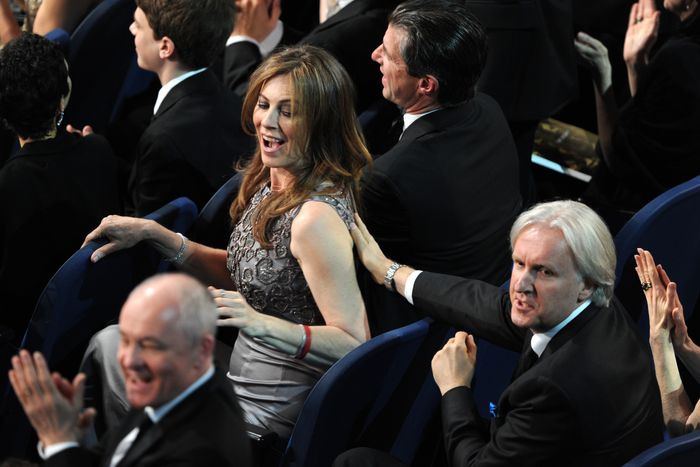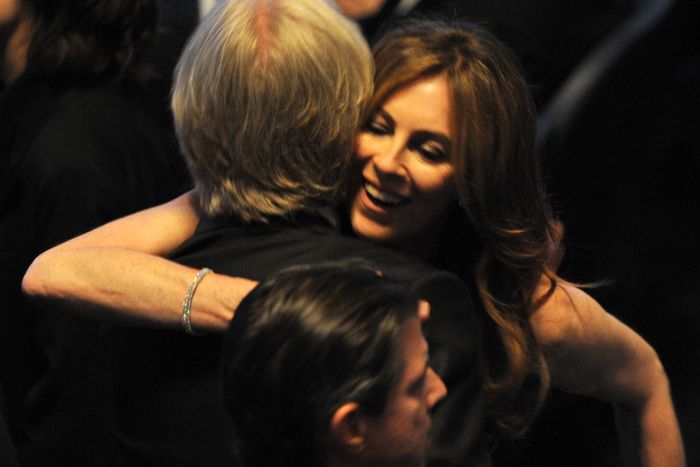
It was an Oscars rivalry like no other: the biggest movie in the world going head-to-head with one of the smallest, each made by ex-spouses with seemingly polar-opposite personalities. On the night of March 7, 2010, Avatar and The Hurt Locker were the two films still in serious contention for Best Picture, pitting James Cameron’s rousing sci-fi parable against Kathryn Bigelow’s suspenseful Iraq War drama. Were the former to win, it would mean a victory for history’s highest-grossing blockbuster. For the latter, it would be a triumph for the lowest-grossing titleholder in the Academy Awards’ 82 years — and the first for a film directed by a woman.
Today, the Fox studio corps responsible for Avatar’s in-house Oscars bid recall that season using the same David-versus-Goliath analogy that journalists employed at the time. Cameron and Bigelow had been divorced since 1991 and by many accounts remained amicable. But the media and Hollywood insiders alike seized on the intrigue behind the pair’s public face-off. How could anyone not? “It’s such a damn good story,” says Jeffrey Godsick, the studio’s former executive vice-president of marketing.
Neither movie began as a Best Picture shoo-in. Fox concocted unprecedented marketing schemes to attract audiences for Avatar, and nothing about the film guaranteed a wall-to-wall awards crusade (especially because Oscars prestige was considered the domain of art-house division Fox Searchlight;¬Ýsee: Slumdog Millionaire, Little Miss Sunshine). The studio knew Avatar‚Äôs technical achievements could thrive in below-the-line categories like Best Visual Effects and Best Art Direction, but the Academy of Motion Picture Arts and Sciences‚Äô top prizes don‚Äôt tend to favor science fiction. It was Cameron‚Äôs longtime producing partner, Jon Landau, who encouraged a push for the top prize, a former Fox executive says.
Meanwhile, The Hurt Locker was a low-budget summer release that, like other movies about the ongoing Iraq War, posted modest box-office returns. (It stalled at $17 million in domestic grosses, a little more than 2 percent of the $785 million that Avatar collected en route to $2.7 billion globally.) A war movie hadn’t nabbed Best Picture since 1996’s The English Patient, and here was one backed by Summit Entertainment, a relatively small distributor with no Oscars to its name.
Against all odds, the personnel behind these films came up with a few key moves that sent them soaring past the competition on that year’s lineup, which included Inglourious Basterds, Precious: Based on the Novel ‘Push’ by Sapphire, A Serious Man, Up, and Up in the Air. The thing is, not everyone agrees on what those moves were.
“Oscar strategies are myths,” says Tom Rothman, then-chairman of Fox Filmed Entertainment. “That’s a thing created by — no offense — the media and the press.” Paid awards strategists “make a lot of money charging people to do things that are utterly fucking entirely irrelevant,” he says. “The Academy sees the movies, and they vote for what they vote for. I don’t know that it takes some genius strategy.”
But call it what you will, Avatar did have a strategy, however late-breaking it may have been. (“I know for a fact we did not have a budget allotted ahead of time,” a source who worked on the campaign says.) Because the immersive 3-D didn’t play as well on the DVDs routinely sent to voters, Fox booked “almost around-the-clock” screenings on the studio lot so everyone in Los Angeles had ample opportunity to see Cameron’s movie as it was intended. That tactic cost money in its own way because Fox couldn’t rent out its theater to other companies. It also resulted in “angry calls” from older Academy members who wanted Avatar DVDs mailed out sooner, the source says.
As more people saw the movie, a potentially damning insinuation took hold: The Hurt Locker was proper cinema, whereas Avatar was mere computer wizardry. Wanting to combat that notion, Fox commissioned public Q&As and elaborate behind-the-scenes featurettes to help Academy and Screen Actors Guild members understand that every blue humanoid had been portrayed by a real performer on a groundbreaking motion-capture set. “We had a little bit of a chip on our shoulder because we were kind of painted by elitist-type press — and it was an easy argument to make — that this was not really acting,” an executive says. “‘Is it animation?’ I think there was almost a defensiveness behind it, which I’m not saying is the right thing. That was one of the tactics used against us. If you’re an Oscar voter, you’re probably like, ‘Well, they already got the box office. Why do they need awards?’”
Or as Godsick puts it, “We knew that being the most successful movie ever wasn’t necessarily going to be something that helped us.”
Indeed, the folks designing The Hurt Locker’s awards blueprint — spearheaded by premier strategist Cynthia Swartz, whose previous campaigns included Best Picture champions Chicago, Crash, and No Country for Old Men — capitalized on the David-versus-Goliath politicking. Unlike Avatar, their movie was perfect for at-home screeners, which Swartz waited until December to send out, bolstering The Hurt Locker’s attention right as Avatar flooded multiplexes. Hurt Locker producer Nicolas Chartier went so far as to email individual voters urging them to choose it over “a $500 million film” — a dig at Avatar’s gargantuan reported budget. Because Academy bylaws forbade “casting a negative or derogatory light on a competing film,” the organization barred Chartier from attending the ceremony, which certain insiders deemed hypocritical given the mudslinging that Harvey Weinstein and his ilk had popularized with impunity.
The Hurt Locker also benefited from a motif that didn’t require any featurettes to explain. “Swartz devised a campaign that rightly cast Bigelow as a brilliant director who could hold her own in a man’s world while raising the prospect of the first female director to win an Oscar,” The Guardian’s Jeremy Kay wrote in 2010. “The idea was intoxicating and I can attest to the speed with which it coursed through Hollywood’s bloodstream. Within a day of the nominations on February 2, there was barely talk of anything else.”


Beyond The Hurt Locker’s little-engine-that-could momentum, the nail in Avatar’s Best Picture coffin may have been the mixed sentiments surrounding Cameron himself. Rita Drucker, former senior vice-president of Fox’s theatrical partnerships, found the self-proclaimed “king of the world” supportive and collaborative but acknowledges that some in Hollywood see him as “mercurial or difficult.” Cameron’s previous movie, Titanic, had already swept the Oscars, and a vote for Bigelow was a vote for history. “It was a ‘let’s not give him the full keys to the kingdom’ kind of thing,” one Fox exec speculates. “I did feel a little backlash on him.”
Throughout the season, anyone expecting bloodthirst instead saw Cameron and Bigelow profess mutual support. On the Oscars red carpet, Cameron said, “She sees my films when I’m writing them and cutting them, and vice versa. She saw Avatar five times at different stages and gave notes, so we’re actually helping each other.”
Heading into the big night, Avatar and The Hurt Locker had each racked up enough precursor awards to level the playing field. The Fox squad always knew Cameron’s hokey, jargon-heavy script wasn’t a likely candidate for Best Original Screenplay, and the fact that it missed out on the category altogether made Best Picture that much more challenging. Still, Avatar’s overall brand saturation left Fox optimistic. What was the last movie to win Best Picture without a Screenplay nod? Titanic.
Fox’s predictions about the technical locks mostly held steady, though The Hurt Locker captured Best Film Editing and both sound accolades as well as Screenplay (for Mark Boal), Best Director, and Best Picture. Cameron was “gracious” about the outcome, one of the Fox sources says. “I remember him going to seek her out afterward,” he recalls of Cameron and Bigelow. “I think he was probably disappointed. I think they all are. You spend that much time and effort on something, and mind you, I don’t think the desire for these things ever goes away because you’ve won before.”
In the press room backstage, Bigelow said, “I think Jim is very inspiring, and I think he inspires filmmakers around the world, and for that I think I can speak for all of them: We’re quite grateful.”
From today’s perspective, the biggest film honor on the planet going to The Hurt Locker may seem at least mildly baffling. Discounting Nomadland (released before COVID-19 vaccines were widely available) and CODA (the first win for a streaming service), it remains the Oscars’ lowest-grossing Best Picture recipient. Spectators like to claim that Avatar doesn’t have much of a tangible cultural footprint, but apart from Bigelow’s monumental victory, The Hurt Locker has even less of one. Case in point: Avatar’s recent rerelease earned an impressive $75.5 million worldwide. This month, Cameron’s interspecies epic begins its ambitious, long-awaited franchise treatment, unleashing the first of multiple sequels. David managed to beat Goliath, but it’s Goliath who gets the final shot.
“In hindsight, it looks like, God, we really had one hand tied behind our back,” the Fox exec says. “A lot of the narrative was about this well-done, well-reviewed war movie by a woman. How could you not support that?”
More on 'Avatar'
- Hey, Nerds, Leave James Cameron’s Remastered Image Quality Alone
- Avatar: Fire and Ash, Moana 2, and More of the Biggest Movies Out of D23 2024
- All of the Avatar Sequel Announcements: A Timeline

